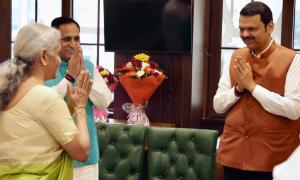Ever wondered what it felt like to be caught between the Devil and the Deep Blue Sea? That is how the Government of India feels right now. And that is why, a week after the war began, and months after talk of war began, India is only now beginning to criticise the war.
There is no doubt that even though India values its growing closeness to the United States, the present war is simply not justifiable; if anything, it sets a dangerous precedent, leaving New Delhi little choice but to speak up.
The US claims this is a war pre-pre-emption: taking on the enemy before he is able to threaten you, let alone become a threat. It is about taking the war to the enemy rather than waiting for him to strike you where you are weakest: at civilian targets at home.
But then Iraq is not Al Qaeda; it is not a terrorist organisation but a country. India understands this urge to attack before being attacked. That is exactly what many in the Indian government would like to do: take the war against terrorism into Pakistani territory, and make Pakistan pay the way Indian civilians have paid over the years at the hands of terrorists backed by Islamabad.
Moreover, India has, after years of Cold War suspicion, gotten close to the US, and it is a friendship New Delhi cherishes, even if Washington is not cracking down hard enough on Pakistan the way some would like it to. The US war cries against Islamic terrorism resonates well at home, more so with a political party that has a deep prejudice against Muslims in seeking votes to win elections (and elections are not too far away). We need US help to contain terrorism, to get technology and investment, and, to be honest, Iraq, despite its oil, is not worth a deep friendship and alliance at this juncture.
But deep down there is a concern for Iraq: a country that has always been India's friend, even on the Kashmir dispute where most of Pakistan's co-religionists sided with Islamabad. And Indians understand only too well what colonialism and imperialism mean: the war against Iraq resonates of white men seeking to subjugate brown men, in the name of civilising them (or their government as is the latest case). Frankly, this simply does not jell with most Indians; it looks suspiciously akin to how the British spread their empire in India; attacking one king after the other and slowly subjugating the country. The US has already spoken of targeting Iran and North Korea after Iraq; who next? Pakistan? India? And where does it end? Have we thrown off the yoke of imperialism only to see it return in the 21st century?
Worse, today Washington is attacking Iraq to change a regime that has committed many wrongs; but will that become an excuse tomorrow to attack India for its wrongs in Kashmir, and God knows, India has done many wrongs in Kashmir, not the least being its human rights record. And then, there is always the question of implementing the UN resolution; Iraq was supposedly attacked for not complying with its UN resolution; will tomorrow the US decide that in all fairness, India must now comply with the UN resolution on Kashmir and hold a plebiscite, and to attack if New Delhi refuses to do so?
The very thought is frightening and leaves one aghast. It is this fear of a rampaging US bullying the rest of the world that has seen so many countries gang up against the United States. It is an image of the US caring little for the United Nations, a body created to avoid war and keep great powers in check against the less powerful. Washington keeps boasting that it has a coalition of some 100 countries, but most of these countries only mean the support of the government, not of the people. It is tragic that the US is seeking to implement democracy, but is backed by governments who are going against the very democratic will of their people. What horrendous hypocrisy!
Coming back to India, New Delhi's predicament can be sympathised with, up to a point. Who do we back? An old and loyal friend, a small country with a dictator at a time when New Delhi has said it does not like dictators, a Muslim country backing whom will make no difference to the Islamic fundamentalists who target India; or the new friend that has a large bag of goodies, along whose side India hopes to be rid of the menace of terrorism and see its economy expand rapidly, but whose motives are not only suspect but deeply flawed and dangerous for the future, a double-edged sword that can be turned against India in the long run, if not the short run.
There is more: as is well documented, the US for years helped Saddam Hussein fight Iran, and then turned against him; ditto with the mujahideen of Afghanistan, who were ditched after they got the Soviets out. We in India would do well not to get carried away by our present friendship with the US, because it is something that may not last very long; Washington is very fickle.
I personally, am not in doubt: the war against Iraq is simply not justifiable, especially without a UN mandate. Much as I would like Saddam Hussein (or any other dictator anywhere else) go, no one, but no one, can or should attack an entire country to remove a leader, not unless attacked first or if the UN justly agrees to such a move. Backing the war can only have short-term gains, but can be very harmful in the long run.
New Delhi has shown the courage to oppose the war and to tell the US that as their friends, we disagree, and that war does not necessarily solve problems but only creates more of them. There are better ways of dealing with Saddam Hussein.








More from rediff